

Linking words (mots de liaison) Such or so ? - English Grammar Today – Cambridge Dictionaries Online. Copy of Grammar Concepts. Grammar mind maps. Also / Too / Either - GrammarBank. Also and too are used in affirmative sentences.
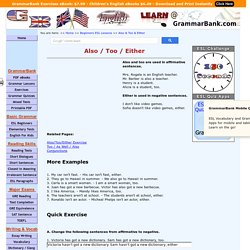
Mrs. Rogala is an English teacher.Mr. Barber is also a teacher.Henry is a student.Alicia is a student, too. Either is used in negative sentences. I don't like video games. Related Pages: Also/Too/Either ExerciseToo / As Well / AlsoConjunctions More Examples 1. Quick Exercise A. Note: There are two alternatives for affirmative answers (using too or also) both of which are accepted but only the answers with also are shown in the box.
THE / A / "0" Anglais express : bien utiliser l'apostrophe. L’apostrophe ( ‘ ) est un signe de ponctuation bien souvent utilisé à mauvais escient.
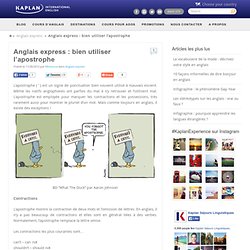
Même les natifs anglophones ont parfois du mal à s’y retrouver et l’utilisent mal. L’apostrophe est employée pour marquer les contractions et les possessions, très rarement aussi pour montrer le pluriel d’un mot. Mais comme toujours en anglais, il existe des exceptions ! BD “What The Duck” par Aaron Johnson Contractions L’apostrophe montre la contraction de deux mots et l’omission de lettres. Les contractions les plus courantes sont… Difference between no and not. We can make a word, expression or clause negative by putting not before it.
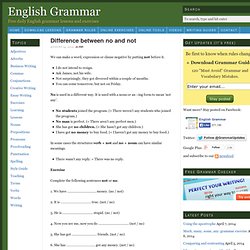
I do not intend to resign.Ask James, not his wife.Not surprisingly, they got divorced within a couple of months.You can come tomorrow, but not on Friday. No is used in a different way. It is used with a noun or an –ing form to mean ‘not any’. No students joined the program. (= There weren’t any students who joined the program.)No man is perfect. (= There aren’t any perfect men.)She has got no children. (= She hasn’t got any children.)I have got no money to buy food. (= I haven’t got any money to buy food.)
In some cases the structures verb + not and no + noun can have similar meanings.
Verbs. Either, neither, both. All, everything or everybody/ everyone. A/- All and everybody/ everyone We do not normally use all to mean everybody/everyone: • Everybody enjoyed the party, (not 'All enjoyed...') But note that we say all of us/ you/ them, not 'everybody of.. • All of us enjoyed the party, (not 'everybody of us') B/- All and everything Sometimes you can use all or everything: • I’ll do all I can to help, or I’ll do everything I can to help.
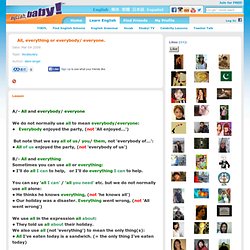
You can say 'all I can' / 'all you need' etc. but we do not normally use all alone: • He thinks he knows everything, (not 'he knows all') • Our holiday was a disaster. We use all in the expression all about: • They told us all about their holiday. We also use all (not 'everything') to mean the only thing(s): • All I've eaten today is a sandwich. (= the only thing I've eaten today) C/- Every/ everybody/ everyone/ everything are singular words, so we use a singular verb: • Every seat in the theatre was taken. • Everybody has arrived, (not 'have arrived')
It's/ Its. These two English words are very often used incorrectly by native speakers.
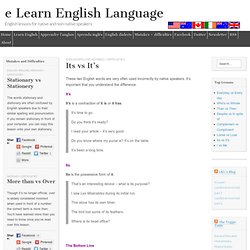
It’s important that you understand the difference. It’s It’s is a contraction of it is or it has. It’s time to go.Do you think it’s ready? I read your article – it’s very good.Do you know where my purse is? Its Its is the possessive form of it. That’s an interesting device – what is its purpose? The Bottom Line The confusion between it’s and its occurs because with virtually every other word, ‘s indicates possession.
The ironclad rule – no exceptions – is that if you can replace the word with it is or it has, use it’s. Related difficulties:
Nouns. Questions.